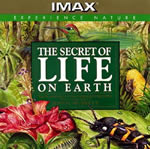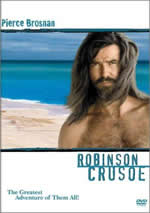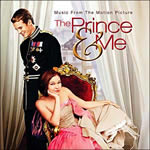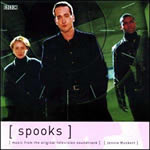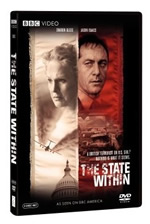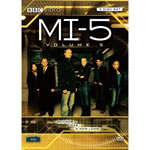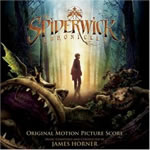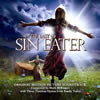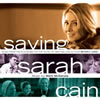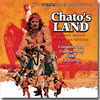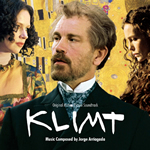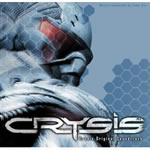 |
Soundtrax: From Jane Goodall to Jane Austen: Jennie Muskett’s Passionate Film Music
January 28th, 2008
By Randall D. Larson
This week, Soundtrax interviews British composer Jennie Muskett, who has adroitly composed music for dozens of natural history documentaries, the hit British TV thriller series, MI-5 (aka Spooks), and most recently provided an eloquent and expressive score for Miss Austen Regrets. We also review The Spiderwick Chronicles and Mark McKenzie’s latest heartfelt scores, The Last Sin Eater and Saving Sarah Cain, along with the latest assortment of film music news.
Jennie Muskett No Regrets – Instinct & Empathy in the
Film Music of Jennie MuskettMultiple award-winning composer Jennie Muskett, known for her action and dramatic scores for the British TV series, Spooks (known as MI-5 in the US) and The State Within, has shifted gears to set a romantic yet dramatic tone to Miss Austen Regrets, based on Jane Austen’s own letters and diaries. Miss Austen Regrets, a co-production of BBC and WGBH, will be presented by PBS’ Masterpiece Theatre on February 3rd. The critically acclaimed mini-series The State Within, also featuring Muskett’s score, was nominated for two Golden Globe Awards.
Based on the life and letters of Jane Austen, Miss Austen Regrets tells the story of the novelist's final years. The drama provides an insight into Austen's own romantic life, examining why, despite setting the standard for romantic fiction, she died having never married or met her own Mr. Darcy. Jennie Musket incorporated a full London orchestra to perform her score.
Widely recognized for her musical contributions, Muskett’s score for the hit BBC series Spooks (MI-5) earned her two BAFTA nominations. Her trademark theme clearly identifies this popular program. In addition, Muskett has scored projects for Miramax, Paramount, Disney, Discovery, IMAX, and the BBC. Over the past two years the British composer has made her mark in Hollywood with scores for Material Girls, starring Hilary Duff and Anjelica Huston and The Prince and Me, directed by Martha Coolidge. “Her music was literally a revelation,” said Coolidge.
Jennie Muskett studied at the prestigious Royal College of Music in London followed by a career as a cellist, playing for notable UK orchestras. Her composing career began when she was invited to write the music for a natural history documentary which spurred further commissions. Muskett’s passion for the environment and the natural world inspires a unique and diverse ethnicity in her scores. Inevitably, Muskett’s documentary work has received worldwide praise, winning her two Emmy’s for “Best Outstanding Original Score” and five Emmy nominations.
Shifting between her London and Southern California workplaces, Muskett keeps apace with modern film scoring techniques while maintaining a romantic’s passion for the psychology of musical characterization. I had the opportunity to interview Muskett last week after completing recording of Miss Austen Regrets in London.
Q: What led you into film music?
Jennie Muskett: It was a very, very strange route! I grew up playing the cello and had an orchestral career in chamber music as a cellist. A chance visit to the Kalari Desert in Botswana was really everything that changed everything, at the moment. The first night I was there, sleeping on the ground, much to the chagrin of the bushmen who thought I was going to be eaten, I just listened to all the sounds around me – the hyenas and the lions and the other creatures, and I just thought, wow, I just want to be part of this. And so I got involved with a natural history filmmaker. One day some of the people got stuck, they didn’t have music, they’d hired composers but they hated the music. They had a network transmission coming up in the States a few weeks hence, and asked me if I’d write the music. I was absolutely terrified, but I did it, and that’s where I really learned my craft. I wrote about 80 to 100 natural history scores, all orchestral, for National Geographic, Discovery Channel, and BBC.
Q: What did you find to be the musical needs of these documentaries?
Jennie Muskett: A lot of it was to convey a sense of place. Since they’re filmed all over the world, and because it’s television and not film, if you want to show the whole of the Namib Desert and get a feeling of the space, it’s very difficult on television, and the music can really help to draw that picture –the dry heat and the expanse, all the close business of the forest. I wrote a score for a guy named Hugo Van Lawick, who made a film of Jane Goodall’s chimps, which he’d shot over 25 years [People of the Forest: The Chimps of Gombe]. It was three generations of the same family of chimps. It was like a soap opera, like watching Friends for several hours! But I couldn’t tell the chimps apart – they just looked like big, black hairy blobs, so my job was really was to give each chimp an identifiable musical character, and that was just the most brilliant place to learn.Q: How did you move from being a musician and a cellist to actually composing? Did you have some background in composition?
Jennie Muskett: No, I had absolutely no background. When I was a scholarship student at the Royal College of Music, for a joke once I’d entered a competition for playing your own modern composition, which was just squeaky and bashing around on the cello and playing part on the bridge with nasty noises and everybody thought it was quite wonderful. But when I was asked to write this first score I felt physically sick at the thought. I knew I couldn’t do it. I went back in the morning and I said, “You know what? I’m really not equipped. Playing other people’s music is a completely different thing and I just don’t have the skill.” The editor fixed me with a hard look and said, “How do you know if you haven’t even tried?”
Q: So I guess the term “self-taught composer” is really applicable in your case.
Jennie Muskett: Yeah. I learnt through doing and having sat in the middle of an orchestra all my life. I know how it should sound. There’s a very clear picture for me.
Q: How long did you perform before you went into composition?
Jennie Muskett: It was quite early that I started writing, in my very early 20s. I played the cello throughout my childhood and I was working in orchestras and performing professionally since I was 16 or 17. Before that I was playing with my parents – we put family concerts on every month with all of these ethnic instruments. We used to travel around Yugoslavia and all these places every summer and collect instruments and learn how to play them and then had the gall to go and play them in public in London! So I’d always been doing it.
Q: I believe your first dramatic feature film score was Robinson Crusoe. How did you find the opportunity to write for dramatic adventure, s distinct from a documentary, and how did those musical needs differ?
Jennie Muskett: It’s remarkably the same. There are conflicts, there are things we all long for and can’t have, there are fights; peoples’ stories are almost the same. We all struggle with the same things, so it’s oddly similar. I guess the really different thing is the kinds of people that you’ll be working with and all of the politics that goes on there, that was an extra layer. But that has nothing to do with the essence and the heart of writing a score.
Q: Over the years you’ve had an opportunity to write the scores for a number of rather compelling thrillers, like B-Monkey, Mister In-Between, Boxed, Dead Gorgeous. What are your recollections of scoring these pictures?
Jennie Muskett: I really, really enjoy these dark thriller chiller things, and it’s so different from anything you find in natural history. That, for me, was a real departure, because suddenly I had to get to grips with an entirely different palette of colors, which is all the weird and amazing textures that you can create with synthesizers mixed with the orchestra. And that was really exciting. I guess I’m a strange character because I like these dark, twisted, conflicted hit men! I quite enjoy that.
Q: A thriller gives you more of an opportunity to invent a musical environment than would a contemporary drama or nature documentary.
Jennie Muskett: Oh, absolutely. On Mister In-Between, the hit man was really a very, very troubled guy, because he wanted to be a nice guy, and he had terrible nightmares about what he did. There’s a singer that I work with, and I called him in and I said, “Look, can you just be demented and weird about all the horrible things that you think of in the middle of the night?!” And we created this horrible, horrible texture of somebody driving themselves mad in the head. I played with it electronically, and that was quite fun!
Q: The Prince and Me gave you the chance to write a wonderful romantic score, and yet the film was also full of songs. As a composer, how did you deal with the “competition,” so to speak, between your score versus the songs inserted into the film?
Jennie Muskett: The part that I was doing was really telling the story and emphasizing key moments. I would just deal with those and look at the whole emotional arc of the story, whereas the songs are popping up and they are appropriate for that particular moment. I’ve got an eye to the entire shape of it and so I’m trying to structure what I do to give it that good strong shape. In that film, there was a song actually that had a really, really long introduction with nothing happening, and so I had to write quite a long cue that led into it and brought the song alive until the vocals finally came, and so it was a nice dovetailing between song and score.
Q: You also scored 12 Days of Christmas Eve and Material Girls for the same director (Martha Coolidge). Any recollections of these projects and working with Martha Coolidge?
Jennie Muskett: She’s great. She’s just such a smart lady and so experienced, and it’s always a joy to work with her. She’s very witty and we’re great friends now. It’s just always a delight working with her. She’s very clear, as well, with what she wants, and that is a breath of fresh air.
Q: How closely do you feel a director and composer should work in establishing the right musical direction for a film? Have there been occasions when that hasn’t happened for you?
Jennie Muskett: It’s distressing when it doesn’t happen. If the director doesn’t kind of feel that he wants to put the time in, then it’s just a trial by error process. I have to write something and then submit it, and then it’s what I call reactive directing, because they’ll just respond, and that’s not the best use of time. If there’s lots and lots of time then that’s no problem at all, you just try something and then change it. But when time is short it’s a shame if they don’t want to put the time in to create a common language and gain an understanding at the beginning. Usually people do want to, because they’ve been working on their film for so long they want to get it right.
Q: You’ve had the luxury of not being typecast into any one genre of music or film, scoring comedies, romances, thrillers, action films. Do you find the variety stimulating?
Jennie Muskett: I love it. I hope I don’t get typecast. I really, really love the variety and not knowing what’s coming next. I think that keeps you awake and alive, and you hopefully continue to do something fresh.
Q: How did you become connected with Spooks (MI-5) and what led to its signature theme?
Jennie Muskett: That was through the director, Bharat Nallury. I had done, actually my very first horrible, dark thing, for him, I think it was something called Shockers, which was a small TV project for new directors. I did two of those, and one of them was just really nasty, it was actually a whole thing with a rape, which was just vile to work with. It was the first time I’d done a dark kind of material, so when he devised the series, he called me in, and so that was quite a journey. They actually called me in very late, because I was the second composer – they had started with somebody and it didn’t work out, and so I actually wrote the theme incredible fast! We were all flying by the seat of our pants.
Q: What is needed to create a signature theme like the one you did for Spooks?
Jennie Muskett: For Spooks, it really had to capture the essence of that program, which has a kind of muscular feel, but not entirely – it’s kind of serious and dark but it’s got a sense of fun as well. And it’s very contemporary and very fast paced. So I really wanted to capture that muscular quality in the theme, and give a little taste of the essence of the show. That’s really the job, and also to be memorable. Something that’s simple and easy to recognize.
Q: What’s your technique at integrating the orchestral and the electronic in scores like these?
Jennie Muskett: It’s very organic. Sometimes I’ll develop a rhythmic template for a sequence first, and then the harmonic structure comes after. Sometimes it’s the other way around. And then once that’s done and its fine tuned, I’ll add more or less, sometimes take away the harmonic part of it. There’s so much dialog and a lot of other sounds to be dealing with – there’s always some kind of alarm or somebody beeper going off. In that show, I made a strong relationship with the dubbing engineer, so we don’t get in the way of each other too much.
Q: Aside from the series’ theme music, you’ve also scored 36 episodes of the show. As the episode scores are developing week after week, do you compose themes for characters, do you reprise the series theme, or is each episode more or less musically distinct?
Jennie Muskett: There are themes for characters. There are themes for things that they do – for example, the three main characters, when they head off to solve their problems, they do this walk, so there’s a little tune called The Walk, when they look really cool and powerful. There’s a little theme for that. There’s a couple of love themes for different characters. The women, in the early series, seemed to be more thoughtful, so there’d be a “thinking theme” – although they’re usually thinking about the guys they can’t have! There were very different themes, but then within that, each episode has a unique quality of its own. One of them was about a suicide bomber, and that had a very distinct storyline of its own, and a whole emotional storyline with its own color, which was very distinct, but within the framework of these other themes that belong to the regular characters.
Q: When you’re scoring a series, do you get into a flow, after a while, once the musical vocabulary has been established, or are there still challenges to coming up with the right tone for episodes?
Jennie Muskett: You do get into a flow, absolutely. The themes are developed and they continue developing, so you don’t have to keep thinking them up. But, sometimes, a director may be brought into the series who’s got a different idea. There was a guy called Justin Chadwick, who came in for a couple of episodes of Spooks. He’s a wonderful director, and he wanted to create a very, very different vibe from everybody else, so those two episodes were more intense. I created something new for nearly all of it. None of the existing themes were used.
Q: In a series like Spooks or The State Within, what is your technique at creating suspense and drive?
Jennie Muskett: I improvise. I watch it through and I notice how it makes me feel. If there’s something that’s falling flat, I’ll use rhythm or harmony. I’ll just keep working at it until it feels right. I don’t really think about the specific techniques. I’m terribly instinctive, and I just do what feels right.
Q: When you’re composing, do you compose at the keyboard or do you notate? What’s your technique?
Jennie Muskett: If I’m working on themes, then I’ll usually work that up at the piano. And I’ll sing and write and use paper and pencil, and then take that over to the computer and refine it there. Sometimes I’ll sit down with the whole picture and play along with it, from start to finish, to see how it feels, and not record anything, just to get to know it get a feel. So I’ll play along with it until it feels right and then start developing more detail, bring it alive, get the pace right, get the tempo right, fine tune it to the editing, and all of those things bring it alive, especially with the action stuff.
Q: The State Within is quite a potent thriller score. When you first came into this project, what initially inspired the direction you would take, musically?
Jennie Muskett: I didn’t know what was doing to happen when I saw episode one. I was only allowed to see the first two episodes, initially, and Dan Percival, the writer, didn’t want me to know what was coming next, because he thought that it was better that I was in suspense, as the audience would be! But that actually became really stressful, because I needed to know where it was going. I needed to know where I was headed so that I could know which themes, and which characters, I’ll need to develop, and what kind of material I need to write for the various elements. There were so many elements in the first episode and I didn’t know where any of them were going, so I actually had to beg and plead to be allowed to see the rest. I didn’t even get to see that until I was quite a way in.
Q: That was a strange handicap to put on a composer.
Jennie Muskett: I hadn’t registered consciously how much you need to know, ahead. I hadn’t given that much thought, it’s always something that’s assumed. Knowing the Sharon Gless character, what kind of character she was and understanding her mettle, enabled me to write the right theme for her, because by seeing her behavior right to the end, I understood what she’s made of. Without that, she would have been one dimensional.
Q: Especially since what you do so well is to impersonate the psychology of these characters, and obviously you need to know the arc of the character to do that appropriately throughout the length of a miniseries.
Jennie Muskett: Yes, that’s the whole essence of scoring. You want to give the undercurrents, the depth, to people, to what’s going on. You’re scoring what you can’t see, not just scoring what is already obviously there.
Q: The mark of a good score is not simply writing nice music to lay on the top of the adventure, the action, whatever, but it’s the ability to emphasize the subtext and develop and speak for characterizations and elements within the story that are not obvious.
Jennie Muskett: Exactly.
Q: Miss Austen Regrets is a beautifully evocative orchestral score, and wholly unlike State Within or Spooks. What elements of the film, when you first became involved, suggested the kind of approach you would take?
Jennie Muskett: I think the core of this story is the poignancy of the sadness of Jane Austin herself. The film concentrates on the period towards the end of her life. She only lived to 42, which was quite common in those times. She died in 1817. I don’t think people lived anywhere near the length of time we do now. So she was realizing that she had forfeited marriage and love and children or her own in order to create these other children, these other characters, in her books. That’s really wonderful to do that and wonderful for all of us, and it was clearly a choice that she made, but there’s a price to be paid for that in the loneliness that comes with it, making the decision to put the creative work before one’s own fun. And so the film deals with her watching her young niece, who really is an English Rose just beginning to blossom and fall in love, and out, and in! And she’s watching this, and it’s very, very poignant. She’s not doing it in a bitter way of “I hate young girls, they’re getting what I couldn’t have!” but in a beautiful, generous, and open hearted way, and that’s the essence of this piece.
Q: Your score builds a poignant psychological portrait of Jane Austin – it’s both romantic and wistful, and yet melancholy and slightly regretful. The score expresses the emotional/psychological aspect of the character that may or may not be conveyed explicitly on the film.
Jennie Muskett: I’m really glad that you can hear all of that, because that’s exactly what I was trying to illustrate in the music. It’s not and really shouldn’t be in the dialog.
Q: What’s your personal technique at finding what it is within a character and then translating that into a musical theme that can be developed over the course of a film?
Jennie Muskett: For me, the trick is just to empathize as much as I can and step into her shoes and feel what it’s like to be her. To just close my eyes and them imagine it, and open my heart to how she feels. Olivia Williams is a wonderful actress, so that wasn’t difficult. And then, being in that state, literally empathizing to the point where I almost am her at that moment, and just sitting and playing, and giving voice to that in a very instinctive way. Like I said, I didn’t do training, so I don’t sit and think, “oh, well this interval, or that chord would be the thing to depict that.” I just feel it. I think it’s through just understanding character and empathizing. Deep empathy.
Q: Do you do your own orchestration, or what’s the process of translating that to the full orchestral size that you’ve used on this score?
Jennie Muskett: Sometimes I do orchestration. On this particular one, they decided that they wanted to increase the lineup and the orchestra, 24 hours before the session! So we had to suddenly find a bigger studio – London was booked, everywhere was booked, so I did call in for help. It was all ready to go, but I did have somebody come in and help sort out the strings a little bit, but it was just a question of notating it and just getting it ready in the time. We literally had one day, and it was crazy. I brought in Matt Dunkley, he works for Craig Armstrong a lot. He also worked with me on Martha’s film, The Prince and Me.
Q: What orchestra did you end up using?
Jennie Muskett: It depends where I am. In London the orchestra is comprised of the leading players from the five symphony orchestra, so it’s real cherry picking time. They play a lot of film scores, so they play in beautiful ensemble together. They’re really phenomenal.
Q: What has been most challenging for you as a film composer?
Jennie Muskett: I think probably Spooks was the most challenging, just trying to stay awake long enough! I think that was the hardest. And then, the gaps in between work. I’ve figured that out now, though, because I always have other things to do, and other things to create. I’m now working on an Evolution Oratorio. I’ve got that going, and then I’ve got some children’s stories that I want to write as tone poems.
Q: What’s been most rewarding for you as a composer for films?
Jennie Muskett: All the amazing people that you meet all the time. Everybody is passionate about what they do, otherwise you wouldn’t go into film, it’s too hard. You would go and get a normal job so you could go home at 5 o’clock! And I love that. Meeting Martha Coolidge, for example, and Bharat Nallury, both very passionate and excited about what they do. And the musicians as well. It’s such a rich life, because you’ve got all the musicians you work with, and the filmmaking side. So it’s exciting and you never know what’s coming next. I love that.
Q: You share your time between Hollywood and London. How does that work for you? With today’s technology, do you need to be physically present in London or Hollywood?
Jennie Muskett: They prefer it if you’re there, but it’s not absolutely essential. I’ve done projects from here, from Santa Monica, in the UK. Interesting enough, there was one that I would say was more collaborative than anything I’ve ever done, because of the way that we used the Internet. I sent my files all the time, and the guy would ring up and say, “I love this and I love that, but could you just change this one little thing?!’ And I’d go and change it, and send it back. So it was the most closely collaborative process I’ve ever had, because we were working on the specifics of the music.
Q: What show was that?
Jennie Muskett: That was actually a natural history assignment [Nature: Penguins of the Antarctic]. I don’t do very many of them, but I have one friend called Mark Fletcher and I’ve continued to work with him, and that was about penguins. I call it The Wrong Penguin Film because it wasn’t the one that went into the theater!
Q: Your music has won awards and been nominated, and you’ve seen your projects grow from television documentaries to acclaimed feature films and television shows. Where would you like to be in another five years? What are your goals as a film composer?
Jennie Muskett: I’d like to do more film work, and I also want to develop these pieces of my own, and see those performed. I think that would be very exciting.
Soundtrack Recommendations
Lakeshore Records will release James Horner’s latest score, The Spiderwick Chronicles, on Feb 5th. The film, due for release Feb. 14th, is based on the series of children's books by Tony Diterlizzi and Holly Black which tell of twin brothers who, along with their sister, find themselves pulled into an alternate world full of faeries and other creatures. Horner’s score is a vibrant high fantasy score, brimming with adventurous melodies and passion. Musical flavors of Harry Potter and Narnia, the film’s conceptual brethren, inevitably find their way into the music, a moment here, and filigree there, but Horner’s overall composition is expressive and elegant. With a trio of children as the film’s protagonists, the musical approach is one of innocence and youthful decency, represented through a fine melody of violins. “So Many New Worlds Revealed” introduces this lush, romantic flavored theme as it emerges out of a chaotic and entwined forest of wicked horns and winds. The motif, ascending slowly, becomes an airy and enchanting flight through the fantastic landscape of Spiderwick. Set against this light-hearted and innocently heroic theme are a series of darker orchestral intonations associated with the goblins and wicked faeries inhabiting the estate to which the kids come to live. “Thimbletack and the Goblins” features an interesting fast-tapped vibrato keyboard figure that punctuates the cue’s martial cadence, progressive into a massive series of descending horn chords over a cyclonic swirling of strings, a huge measure of epic scope that emphasizes the strangitude of the developing story. “Hogsqueal’s Warning Of a Bargain With Mulgarath” is a very humorous track, almost Felliniesque in its strange orchestral flavoring, while “Discovering Spiderwick’s Secret Workshop” is an elegant, rhythmic mysterioso that is quite compelling in its fluid development and forward motion. “Dark Armies of the Forest Attack” is a harsh and propulsive action track, ferociously swelling horns and wind-whipped violins roaring over a tremendous scampering of large drums. Unsurprisingly, with a title like “The Flight of the Griffin,” this is one of the score’s best tracks, soaring gracefully and powerfully with vast violin wings, driven by twittering cheers from the brass that recall bright moments of the composer’s old Star Trek scores. “James and Mulgraph Fight For the Chronicles” is the score’s action set-piece, furious battle music as earthy as the mud-strewn Spiderwick ground, beset by heavy steel blades and brutal wooden clubs; yet in the midst of it is Horner’s jaunty “Hogsqueal” motif, reminding us that all is not a lost cause. “Coming Home” invests the film’s finale with a carnival like conclusion, wrapping up the prior danger music with an air of excitement and welcome-home relief. “Closing Credits” provides a splendid 8:23 minutes overture that recaptures the score’s melodic enchantment. Horner seems to have fallen off the radar a little bit in recent years, despite a masterful but understated score for 2006’s Apocalypto; Spiderwick Chronicles brings back the Horner of Cocoon and Casper, Krull and Willow, gentle fantasies and morality plays with simple clear-cut and vastly likable melodic, larger-than-life scores.
Mark McKenzie’s amazing gifts for passionate melody and orchestral poignancy are well-displayed in The Last Sin Eater, released on Warner’s Word/Curb label. The film, directed by Michael Landon Jr. and based on the novel by Francine Rivers, is an emotive tale of sin and redemption as experienced through a young girl’s quest for forgiveness. The title has to do with a true Celtic ritual practiced by Welsh immigrants coming to America in the 1800s; viewers of Night Gallery may remember this from the “Sins of the Father” episode; although Landon’s approach is far more prosaic!). Bookended and bridged by a trio of hymns performed by country roots crooner Randy Travis, McKenzie’s score is brilliantly heartfelt, drawn from an idiom of Americana, and invested with amazing melodies and an extraordinarily expressive acoustical palette featuring pan pipes, oboe, harp, and fiddle as key elements of a large orchestral ensemble. The music is both intricately tender and soaringly joyful, illuminating both the suffering of guilt and the promise of redemption that is part of the character’s journey through faith. The score lends a voice to the spiritual overtones that inform the film’s storyline and which are central to the young girl’s quest; as the story develops, the music also roams from 19th Century Americana into realms of spiritual light and darkness, and back again. McKenzie’s evocative melodies carry the listener safely on this journey, enriching both mind and spirit with his intensely passionate melodies and arrangements during the travel. Taking full advantage of both the Slovak Symphony Orchestra and the Los Angeles Orchestra during multiple recording sessions, the score’s crystal clarity allows the score’s vivid melodic design to glow. “The thing that attracts me most to Michael Landon and Brian Bird's film making is the strong story telling, rich emotional content, and the way their films bring renewal and hope,” McKenzie says. “I strived for those elements in the orchestral grandeur and intimate solos contained in this score.”
The Last Sin Eater is indeed one of 2007’s most beautiful and expressive film scores.
Word/Curb has also released McKenzie’s second score for Landon Jr., a contemporary Amish drama called Saving Sarah Cain, which is equally worth savoring. It’s a provocative drama that explores cultural barriers, differences, diversity, and the steadfastness of faith and compassion. When Sarah Cain, a self-involved big-city newspaper columnist, travels to Pennsylvania for the funeral of her Amish sister, she soon discovers that she is the legal guardian of her five Amish nieces and nephews. Extracting them from their Amish community and taking them back to Portland with her proves to be the wrong choice, and facing the difference in cultures brings Sarah to her own crossroads. McKenzie’s score is a little more subdued than that of Last Sin Eater, while still drawn from poignant if understated melodies and a vivid acoustic ensemble favoring winds and piano. Reflecting the peaceful and simple lives of the Amish, McKenzie’s score emphasizes similar qualities, musically. “It seemed most effective to compose peaceful, simple, loving, and almost meditative music with gentle melodies, muted strings, sensitively performed woodwinds, piano solos, and a faint, ethereal, child soprano voice which serves as a subliminal reminder of Sarah’s sister Ivy,” writes McKenzie in his CD note. The eerie, subliminally high tones that waft above the piano melody in “Love Letter” seem to impart their own spiritual correspondence; while the lower tonalities of “Those Were Our Tears!” becomes a captivating tone poem for emotional hurt and loss, a broodingly passionate and redemptively healing composition. The score open up a bit more in “She Prayed For You Everyday,” with a climbing violin melody; and with a beautifully textured piano and strings yearning arrangement in “Don’t Leave Us.” The CD also includes a trio of songs performed by noted Christian recording artists, Point of Grace, Barlowgirl, and Building 429.
Oscar Nominations for Film Music
The Academy of Motion Picture Arts & Sciences has announced the nominations for the 80th Academy Awards. The film music categories are:
Achievement in music written for motion pictures (Original score):
Atonement (Dario Marianelli)
The Kite Runner (Alberto Iglesias)
Michael Clayton (James Newton Howard)
Ratatouille (Michael Giacchino)
3:10 to Yuma (Marco Beltrami)
Achievement in music written for motion pictures (Original song)
“Falling Slowly” from Once (Music and Lyric by Glen Hansard and Marketa Irglova)
“Happy Working Song” from Enchanted (Music by Alan Menken, Lyric by Stephen Schwartz)
“Raise It Up” from August Rush (Nominees to be determined)
“So Close” from Enchanted (Music by Alan Menken, Lyric by Stephen Schwartz)
“That’s How You Know” from Enchanted (Music by Alan Menken, Lyric by Stephen Schwartz)Academy Awards for outstanding film achievements of 2007 will be presented on Sunday, February 24, 2008, at the Kodak Theatre in Hollywood. For a complete list of nominations, see:
http://www.oscars.org/80academyawards/nominees/index.htmlBAFTA Nominations for Film Music
The British Academy Award nominations have also been announced. The music nominees are:
American Gangster – Marc Streitenfeld
Atonement – Dario Marianelli
The Kite Runner – Alberto Iglesias
There Will Be Blood – Jonny Greenwood
La Vie En Rose – Christopher GunningThe Orange British Academy Film Awards take place on Sunday February 10 in London.
See: http://www.bafta.org/awards/
4th Annual International Film Music Critics Association Awards
The International Film Music Critics Association announces their 2007 nominees for excellence in scoring for film and other visual media. Alexandre Desplat leads the nominations with seven, including two for Best Score of 2007: Ang Lee’s romance drama Lust, Caution, and the fantasy adventure The Golden Compass. Dario Marianelli, who recently won the Golden Globe for Best Score for Atonement, is nominated for four awards for the Joe Wright-directed World War II drama. Tied with Marianelli with four nominations is Michael Giacchino, who is up for Best Score for the animated film Ratatouille, as well as for his nomination in the newly-formed Best Original Score for a Video Game or Interactive Media category for his Medal Of Honor: Airborne score.
Other composers with multiple nominations include John Debney (2), David Shire (2), newcomer Fernando Velázquez (2), Christopher Young (2) Aaron Zigman (2) and Hans Zimmer (2).
The winners will be announced on Friday, 15 February 2008.
The International Film Music Critics Association (IFMCA) is an association of online, print and radio journalists who specialize in writing about original film and television music. The IFMCA Awards are the only awards given to composers by film music journalists.
For more information about the International Film Music Critics Association, please visit http://www.filmmusiccritics.org
Film Score News
The cinema verite style of Cloverfield, perhaps the best Giant Monster Attacks Mankind (GMAM) movie I’ve seen in decades, precludes the use of score in the film – but be sure to catch Michael Giacchino’s homage to Akira Ifukube, called “Roar,” in the End Credits. It’s not there yet but we’re hoping it will soon become available via iTunes. In the meantime, somebody posted the music, in poor quality recorded in the theater, at http://www.youtube.com/watch?v=s4p3rM9jOdE
Tyler Bates’ latest movie Doomsday (Neil Marshall’s upcoming Rogue Pictures release) may be March 14th, but the future is looking bright with the signing of two major films for 2008: Zach Snyder’s Watchmen, based on the acclaimed graphic novel from Alan Moore and Dave Gibbons, and Fox’s remake of the 1951 sci fi classic, The Day the Earth Stood Still directed by Scott Derrickson (The Exorcism of Emily Rose), starring Keanu Reeves, Jennifer Connelly and Kathy Bates.Award-winning composer Christopher Young adds to an impressive list of nearly 100 feature films in virtually every genre with the score to Screen Gems/Lakeshore Entertainment release Untraceable, the latest thriller by director Gregory Hoblit from a script by Allison Burnett. Starring Best Actress Oscar nominee Diane Lane, Untraceable, which opened last Friday, centers on an FBI cyber cop (Lane) as she races to track down a ruthless online predator who conducts violent and painful murders live on the net.
In addition to his busy film-composing schedule, Young continues to impart his experience and knowledge to a new generation of film composers by teaching at USC, which he has done since the early Nineties. Young also recently completed Sleepwalking, a drama from director Bill Maher starring Charlize Theron, Dennis Hopper and Woody Harrelson, which premiered at the Sundance Film Festival January 22. Lakeshore will release the Untraceable score on CD on Mar. 4.Trevor Rabin takes on the spy spoof Get Smart, recording his score at the Eastwood Scoring Stage. He uses the main theme from the hit television series that the film is based on. For a photo report of the scoring session, see: www.scoringsessions.com/news/117/
Oscar-nominated composer Dario Marianelli has been signed on to score yet another film produced by Working Title (he previously scored the recent Golden Globe-winning and Academy Award-nominated Atonement as well as Pride and Prejudice). The new project is Hippie Hippie Shake, a drama taking place in London at the end of the 1960s. – via upcomingfilmscores.com
Composer Aaron Zigman has reunited with director/writer/star Tyler Perry to score Lionsgate's comedy, Meet the Browns. Zigman also scored Perry’s 2007 comedy, Why Did I Get Married? The new film features a large orchestral score. – via scoringsessions.com
Composer Nicholas Hooper will team up again with director David Yates scoring his second Harry Potter film for Warner Bros, Harry Potter and the Half Blood Prince. – via upcomingfilmscores.com
Igor, an animated monster comedy focusing on a mad scientist’s hunchbacked lab assistance and featuring the voices of John Cusack, Steve Buscemi and John Cleese, will get an original score by Patrick Doyle. – via upcomingfilmscores.com
Leading Japanese film composer Kenji Kawai is doing the score for his eighth film directed by Hideo Nakata, L: Change the World. Among their previous films together are the original Ring horror films and Dark Water, and Kawai has also composed music for Nakata's Kaidan last year. L: Change the World follows the 2006 thriller Death Note, directed by Shusuke Kaneko and also with a score by Kawai, and follows the character named 'L' who appeared already in Death Note. Among Kawai's other upcoming film scoring assignments are horror film Orochi and the animated The Sky Crawlers. - via upcomingfilmscores.com
Soundtrack News
Intrada Announces Special Collection Vol. 58, Jerry Fielding’s Chato’s Land. The 1972 film starred Charles Bronson as Chato, an Apache "breed" who kills the local sheriff in self-defense. A posse pursues, but they underestimate Chato, who toys and lures them into hostile terrain. When things escalate, Chato moves from toying to killing. Chato's Land is essentially a tale of race hatred and was directed by Michael Winner – another in a series of knock-out Fielding/Winner/Bronson
Intrada’s album is the first release of Chato's Land to use the first generation stereo session tapes from MGM's library, bringing a new depth and clarity previously unheard, and offering the first complete presentation of the score, adding several precious minutes of previously unreleased music to this powerful and aggressive score. This release is limited to 1500 albums.Varese Sarabande will release Atli Örvarsson’s score for Vantage Point, the new political thriller starring Dennis Quaid, Matthew Fox, William Hurt, Forest Whitaker, and Sigourney Weaver, on Feb. 26th. The same date will see Varese’s soundtrack to Paul Cantelon’s music from The Other Boleyn Girl, based on the historical novel by Philippa Gregory, and provocatively starring Natalie Portman and Scarlett Johansson.
MovieScoreMedia will release Klimt on Feb 12th. Composer Jorge Arriagada, who is best known for his scores for Our Lady of the Assassins, Le Temps retrouvé and Comedy of Innocence, has written a very interesting and beautiful score for fellow Chilean director Raoul Ruiz's biopic about famous Austrian painter Gustav Klimt, portrayed here by John Malkovich. Evoking the music of 1920's Vienna, the score features influences from classical composers such as Mahler, Schubert, Strauss, Berg and Schönberg, performed with great flair by the Sinfonia of London. The film was nominated to the Golden St. George Award at the 2006 Moscow International Film Festival and co-stars Saffron Burrows and Veronica Ferres.
The soundtrack is available on limited edition CD (500 copies) and as a download from iTunes.
Game Score News
Sumthing Else Music Works, Inc., through a licensing relationship with Crytek, proudly presents Crysis Original Soundtrack. The soundtrack from the next-generation PC first-person shooter comes out this through Nile Rodgers’ Sumthing Else Music Works record label www.sumthing.com, and for digital download at www.sumthingdigital.com and iTunes. The Crysis Original Soundtrack features over an hour of original orchestral music written and conducted by award-winning film, television and video game composer Inon Zur and performed by the Northwest Sinfonia Orchestra. Renowned for composing emotionally dynamic orchestral music, Inon Zur was commissioned by Crytek to produce a modern cinematic score that heightens the impact of the dramatic storyline, realistic environments and highly-evolved gameplay.
Renowned for his Hollywood caliber orchestral writing, multiple award-winning composer Richard Jacques (Headhunter, Mass Effect) has scored an original music soundtrack for Conflict: Denied Ops, a new two-player co-op first person shooter from Pivotal Games and the fifth game in the best-selling Conflict series. Conflict: Denied Ops will be released on Xbox 360, PlayStation 3 and PC in February 2008. To complement the non-stop action and cinematic moments throughout the game, Jacques composed an energetic military score that employs traditional ethnic instruments and vocals for the settings across Africa, South America and Russia. The music is fully interactive, reacting to the player’s movements, and enhances the immersive experience of the fast-paced gameplay.“Richard Jacques’ work on Conflict: Denied Ops has been inspirational,” said Stuart Poole, Senior Producer at Pivotal Games. “He rose to the challenge of producing dynamic music for multiple regions and has given Conflict: Denied Ops its own distinct sound whilst giving each region in the game its own unique feel. The music deeply enhances the gaming experience by making the player feel very much part of the action.”
For more information on Richard Jacques please visit: www.richardjacques.com.
For more information on Conflict: Denied Ops, please visit: www.conflict.com.
Film Music on DVD
The El Cid DVD box set released this week includes a featurette on disc 2 called Miklos Rozsa: Maestro of the Movies, a 30-minute overview of one of the most respected film composers. It concludes with several inspirational and touching memories from John Mauceri about the elderly Rozsa.
MGM’s 40th Anniversary Collector’s Edition DVD of In the Heat of the Night also has a music feature called Quincy Jones: Breaking new Sound.
Kino’s new 2-DVD release of F.W. Murnau’s classic 1922 version of Dracula, Nosferatu, finally re-joins the film with Hans Erdmann’s original 1922 film score. Recent DVD releases have featured newly-composed scores of various style and effectiveness (the best, of course, was the 1997 BBC restoration scored by Hammer’s own James Bernard). An accompanying booklet on the restoration process describes how Erdmann’s score, believed to be lost, was reconstructed from a Giuseppe Becce orchestral work that adapted it into suite form, and at long last remarried the original score to the original film.
Columbia’s new two-disc reissues of the Harryhausen classics, Earth vs. the Flying Saucers and It Came From Beneath the Sea, both feature "David Schecter on Film Music's Unsung Hero," with Monstrous Movie Music’s David Schecter discussing film composer Mischa Bakaleinikoff's work on monster themes. In the 20-minute feature, Schecter authoritatively provides a lot of information about how the music in Ray Harryhausen flicks was pieced together from other sources by Bakaleinikoff, and how the B-movies were scored much differently than A-pictures in 1950s Hollywood, which is largely why Bakaleinikoff is so unknown today, even though his work is so effetcive. This same featurette appears on the 30th anniversary DVD of 20 Million Miles To Earth, released last July.
Randall Larson was for many years senior editor for Soundtrack Magazine, publisher of CinemaScore: The Film Music Journal, and a film music columnist for Cinefantastique magazine. A specialist on horror film music, he is the author of Musique Fantastique: A Survey of Film Music from the Fantastic Cinema and Music From the House of Hammer. He now reviews soundtracks Music from the Movies, Cemetery Dance magazine, and writes for Film Music Magazine and others.



